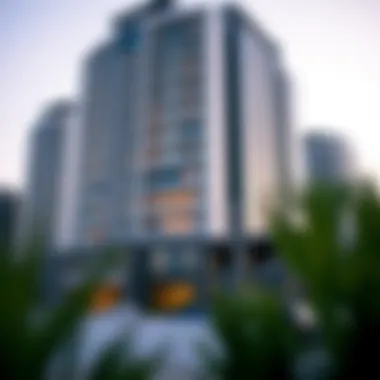Navigating Dubai's Real Estate Market Insights


Intro
Dubai, often called the City of Gold, is not just about luxurious malls and towering skyscrapers. Its real estate market is as dynamic as its vibrant culture. For investors and homebuyers alike, understanding the nuances of this market is crucial. Whether you're a first-timer or a seasoned hand, you might want to tune in closely to what this bustling metropolis has to offer. This article lays the groundwork, diving deep into the evolving frameworks that shape the housing market, helping potential buyers navigate these waters with confidence.
Market Trends
The landscape of Dubai's real estate is constantly shifting, influenced by various economic factors, policy changes, and global events. Keeping a keen eye on the market trends can provide vital clues for those looking to make a purchase or investment.
Current Property Prices
Right now, property prices in Dubai show a variety of trends across different areas. Generally speaking, central areas like Downtown Dubai and Dubai Marina continue to command high prices. Yet, there are hidden gems elsewhere. For example, communities such as Dubai South and Dubai Hills have been emerging as favored spots for both expats and investors due to their affordability coupled with luxury living attributes. According to ValuStrat, the overall market has seen slight fluctuations, but long-term demand remains robust.
Important Insight: These areas are experiencing growing investor interest, especially from expatriates looking for both homes and rental opportunities.
Future Market Predictions
What does the crystal ball say? Analysts are generally optimistic. The introduction of new infrastructure projects and changes in government regulations are set to bolster the market. For instance, the UAE's Golden Visa initiative, designed to attract foreign talent, is expected to inject fresh enthusiasm into residential purchases. The next few years could see a steady uptick in property values, particularly in areas poised for development. If one is looking to invest, keeping watch on these upcoming neighborhoods can yield fruitful results.
Investment Strategies
Navigating the real estate waters can feel like sailing through a storm. However, appropriate strategies can help shore up your prospects. Here are some practical considerations.
Smart Buying Tips
- Research Thoroughly: Look into various neighborhoods and gauge their future potential. Resources like Bayut are invaluable for such insights.
- Understand the Regulations: Real estate laws in Dubai can differ significantly from other countries. Knowing what’s legal or illegal when buying or leasing is non-negotiable.
- Timing is Key: Pay attention to seasonal fluctuations in prices. Buying during quieter months might yield better deals.
Financing Options
Understanding your financing options can help enhance your buying power. Local banks often offer competitive mortgage rates for expatriates, but be mindful of the associated fees and requirements.
- Fixed Rate Mortgages: These offer stability in payments, suitable for long-term homeowners.
- Adjustable Rate Mortgages: These can lower initial payments but may pose risks later on.
- Cash Purchases: If you have liquidity, cash transactions can be more appealing to sellers, often leading to better negotiations.
In summary, Dubai's real estate market may seem daunting at first, but with informed decision-making and strategic foresight, there are wonderful opportunities waiting to be discovered. Whether it's the lure of a new home or a smart investment, understanding the complexities surrounding this landscape is vital for future success.
For further details on Dubai's real estate trends, visit Dubai Land Department to get the latest updates on regulations and market conditions.
Prelude to Dubai's Real Estate Market
The allure of Dubai's real estate market cannot be overstated. This vibrant city has undergone a remarkable transformation over the past few decades, evolving into a global hub that captures the imagination of investors, homeowners, and expatriates alike. Understanding the dynamics of this market is crucial for anyone considering navigating the property landscape in Dubai.
The importance of grasping the nuances of Dubai's real estate market lies in its potential benefits. The city offers a unique blend of high returns on investments, luxurious living standards, and a growing expatriate community. Buyers and investors who can decode this market stand to gain significantly, whether through residential purchases or commercial opportunities.
Historical Context
Dubai's rise in the real estate sector is as fascinating as it is instructive. Historically, the city was known primarily for its trade in pearls and gold, but the boom began in earnest in the late 20th century when the government started to diversify the economy. The discovery of oil in the 1960s provided a substantial economic foundation, though it was the ambitious visions of the leadership that spurred transformative real estate development beginning in the 1990s.
The introduction of the Dubai Land Department in 1960 and the subsequent real estate regulations laid the groundwork for modern property laws. Dubai was one of the first places in the Gulf to allow foreign investments, making it an attractive destination for a wide range of investors. By the early 2000s, skyscrapers began to dominate the skyline, highlighting the region’s architectural innovation.
Understanding this historical context is vital; it sheds light on current trends and future possibilities. It illustrate how rapid growth often came with challenges such as market volatility and regulatory hurdles, but also highlights opportunities for those ready to engage.
Current Market Overview
Today, Dubai’s real estate landscape presents a medley of possibilities. With government initiatives aimed at enhancing the city's status as a prime global investment destination, the market has witnessed a substantial influx of capital. As of late 2023, reports indicate a noticeable upward trend in property prices, particularly in luxury segments like Palm Jumeirah and Downtown Dubai. Moreover, with an increase in lifestyle amenities and infrastructure enhancements, regions on the outskirts, like Dubai South and Dubai Hills Estate, have also become highly sought after.
Investors must pay attention to various factors influencing the current market, such as:
- Regulatory Advances: Streamlined processes for property registration and clearer foreign ownership laws make investment more appealing.
- Economic Recovery: The rebound post-pandemic has energized sectors including tourism, leading to increased demand for rental properties.
- Technological Integration: The use of advanced real estate technology (PropTech) has made property transactions smoother and more transparent than ever.
As a potential buyer, being up-to-date with the current market overview equips one with essential knowledge to navigate effectively, ensuring well-informed decisions.
"Knowledge is power, especially in a fast-moving market like Dubai’s real estate."
Key Drivers of Real Estate Growth in Dubai
Dubai's real estate market is not just a superficial reflection of economic trends; it's a vibrant tapestry woven together by several interrelated factors. Understanding the key drivers behind this growth provides critical insights for investors, homeowners, and real estate professionals alike. Just like knowing the nuances of a good recipe can elevate a meal, grasping the economic, demographic, and regulatory factors that affect Dubai's real estate can lead to smarter investment decisions. This section dives deep into those very drivers that propel the market forward, setting the stage for an informed participation in one of the most dynamic property landscapes in the world.
Economic Factors
If one were to pinpoint a single, powerful driver in Dubai's real estate sector, it would undoubtedly be the economic landscape. The emirate's economy has diversified impressively beyond oil reliance, with sectors like tourism, trade, and finance taking center stage. The buzz around events such as the World Expo and significant foreign investment projects tends to set the tone for market optimism.


Investors often look for indicators like the Gross Domestic Product, foreign direct investment flows, and employment rates. To illustrate this further, in 2022, Dubai's GDP grew by about 6.2%, signaling that the economy is on a solid footing. This kind of growth translates into increased purchasing power, leading to more property transactions.
- Tax Benefits: Income tax is virtually non-existent, serving as an attractive proposition for foreign investors. This directly boosts demand for both residential and commercial properties.
- Market Stability: Although the region has seen ups and downs, the infrastructure and governance of Dubai generally ensure a degree of stability. Investors can be more confident, engaging in transactions that might be perceived as riskier elsewhere.
"Investing in Dubai offers a unique blend of opportunity, vibrant lifestyle, and competitive returns, unlike many other modern cities."
Population Dynamics
Another essential driver behind the real estate boom in Dubai is its dynamic population trends, particularly the influx of expatriates. The city is a melting pot of cultures, drawing in professionals from all over the world. Simply put, more people translate into more housing demand, and this demand is not just for any old property; it’s for quality, diversified real estate options.
- Demographic Trends: Dubai has a high percentage of working-age individuals, and with a growing young population, there is a consistent demand for housing that meets modern lifestyle preferences. New developments in areas like Dubai Marina and Jumeirah Village Circle cater to this demographic, offering amenities that appeal to young professionals.
- Continued Growth: Recent projections suggest that the population may exceed 3 million by 2030, resulting in sustained interest in residential properties, particularly in expat-dominated areas.
In turn, as more expatriates choose to live and work in such a fast-paced environment, it creates a multifaceted demand for housing types ranging from budget-friendly apartments to luxurious villas. This natural ebb and flow of population dynamics is distinctly pivotal for investors looking to tap into Dubai's vibrant rental market.
Government Initiatives
Public policy has a profound influence on real estate markets, and Dubai is no exception. The local government has rolled out an array of initiatives aimed at reducing bureaucratic hurdles and fostering foreign investment. These moves have led to both immediate and long-term favorable conditions for real estate growth.
- Freehold Investments: The introduction of freehold ownership in specified areas allows foreign buyers to invest with confidence, knowing they can own their properties outright.
- Visa Incentives: Long-term visa programs for property owners, which permit expatriates to live in the UAE for extended periods, have made the market even more inviting.
- Infrastructure Projects: Significant investments in infrastructure, such as expansions to the Dubai Metro, support real estate developments by improving accessibility. Areas around these developments tend to witness a surge in property value, benefiting investors who are aware of these trends.
In summary, the key drivers of real estate growth in Dubai are intertwined elements that not only reflect the current market conditions but also provide a roadmap for future opportunities. Investors who understand these factors will be better positioned to navigate this deeply layered landscape.
Investment Strategies
When navigating the vibrant landscape of Dubai's real estate, understanding investment strategies forms the core of successful property dealings. Given the city's accelerated growth and ever-changing market dynamics, investors must develop tailored approaches to harness the potential of this lucrative circuit. Key elements in these strategies often revolve around market timing, asset selection, and the long-term versus short-term investment outlook.
Understanding Risk and Reward
Every investment carries a degree of risk, and in Dubai, the real estate market is no different. Understanding the balance of risk versus reward is crucial for anyone looking to invest. Markets can fluctuate based on various factors like economic conditions or global demand. For instance, while a property in Downtown Dubai may promise high rental yields, it may also be subject to declining demand during global economic downturns. Investors must conduct due diligence, scrutinizing property valuations and market trends, to narrow down risks effectively. Proper analysis can often mean the difference between a thriving portfolio and a sunk cost.
Long-term vs Short-term Investments
Investors often face the choice between long-term and short-term investment strategies. Each holds its merits and disadvantages. Long-term investments—typically defined as properties held for five years or more—are considered stable. They offer steadier returns through rental income and capital appreciation. For instance, communities like Arabian Ranches may prove favorable for families seeking stability, thus encouraging long-term investments.
Conversely, short-term investments, such as flipping properties, capitalize on quick turnover. Savvy investors may purchase undervalued homes, renovate them, and resell them for a profit. While potentially lucrative, this method requires careful timing and substantial market knowledge.
Rental Market Insights
The rental market in Dubai reflects a dynamic sector that attracts both expatriates and professionals, making it an alluring point of interest for investors. Understanding rental rates in various neighborhoods helps identify lucrative opportunities. For example, areas like Dubai Marina or Jumeirah Beach Residence command premium rents owing to their waterfront locations and amenities.
Moreover, the demand for short-term rentals via platforms like Airbnb has surged, enticing many to explore this avenue. However, local regulations and community guidelines need to be considered seriously. Familiarity with the legalities surrounding rental agreements can mitigate potential pitfalls.
"Knowledge of the rental market is like a compass; it guides investors through the uncertainty of real estate trends."
In closing, effective investment strategies in Dubai's real estate market converge on knowledge, research, and foresight. By grasping the intricacies of risk and reward, evaluating the benefits of long-term versus short-term investments, and navigating the vibrant rental landscape, investors can optimize their opportunities in what is undeniably a thrilling marketplace.
For more comprehensive insights and up-to-date market analyses, one might visit trusted sources such as Wikipedia or Britannica. It's essential to stay informed and connected to industry trends to make sound investment choices.
Navigating the Buying Process
Navigating the property buying process in Dubai is an essential aspect for anyone considering entering its dynamic real estate market. Understanding how to maneuver through the complexities can simplify daunting experiences for both investors and homebuyers. From recognizing the right property to understanding financial commitments, all these aspects can influence the outcome of one’s real estate journey. For many, it’s more than just a transaction; it’s about securing a future—whether that's for living or as an investment.
Step-by-Step Guide to Purchasing Property
Purchasing property in Dubai involves a series of clearly defined steps. Here’s a straightforward approach:
- Research the Market: Start with extensive research to familiarize yourself with various neighborhoods, property types, and pricing trends. Websites like Bayut and Property Finder offer a wealth of information.
- Budget Plan: Assess your financial position. Determine how much you can afford while accounting for additional costs like registration fees, agent commissions, and maintenance charges.
- Engage a Realtor: Consider hiring a qualified real estate agent familiar with the local market. Their insights can prove invaluable in identifying suitable properties and negotiating terms.
- Property Viewing: Visit multiple properties to compare features and advantages. Sometimes, first impressions can be misleading, so it’s worthwhile to keep an open mind.
- Make an Offer: After picking a property, submit a formal offer outlining your proposed price and any conditions you wish to set. Negotiation is a common practice here.
- Sign the Sales Agreement: Once both parties agree on terms, a Memorandum of Understanding (MOU) is typically signed, with a deposit paid.
- Secure Financing: Begin the process of securing a mortgage, if necessary. Ensure you have all required documentation ready.
- Final Inspection: Before the final payment, conduct a thorough inspection to ensure everything is as agreed upon.
- Transfer Ownership: The final step involves registering the property with the Dubai Land Department. This is where you'll also settle any applicable fees.
Financing Options Available
Financing your property purchase in Dubai can be done through various channels. Here are a few prevalent options:
- Mortgage from Local Banks: Many banks in Dubai offer mortgages for both residents and expatriates. Typically, expats can borrow up to 75% of the property value.
- Developer Financing Plans: Some developers provide financing solutions directly, allowing buyers to pay in installments during the construction phase.
- Cash Purchases: If liquidity allows, purchasing outright can not only simplify the buying process but might also provide negotiating leverage during discussions.
- Financial Brokers: Utilizing the services of a mortgage broker can help in navigating financial products available in the emirate, assisting you in finding favorable rates and terms.
Legal Considerations
Understanding the legal landscape is crucial when buying property in Dubai. This includes:
- Freehold vs Leasehold Properties: Knowing the difference is fundamental. Freehold means ownership, whereas leasehold typically involves agreements lasting up to 99 years, after which ownership reverts to the landowner.
- Legal Fees: Expect to incur costs related to registration, notary services, and possible administrative expenses. These typically range around 4% of the property value.
- Property Ownership Restrictions: Be aware of who can buy property in Dubai. For instance, certain areas are designated for expatriates, while others may have specific ownership restrictions.
- Due Diligence: Conducting thorough checks on the property’s title deed, encumbrances, and zoning regulations is vital to avoid future complications.


Navigating the buying process is like navigating a bustling market; it requires patience, attention to details, and an understanding of the local environment. By following these structured steps and paying attention to critical financial and legal elements, one can make informed decisions and successfully secure their desired property in Dubai.
"The first step in the journey is often the hardest, but with the right knowledge and guidance, what might seem like a maze can transform into a straight road."
For additional detailed insights, consider checking resources such as Dubai Land Department.
Understanding Neighborhood Dynamics
The intricate fabric of Dubai’s real estate market is woven not just with soaring skyscrapers and luxurious villas, but also with the diverse neighborhoods that give life to this vibrant city. Understanding neighborhood dynamics is essential for anyone looking to navigate this landscape effectively. Each area in Dubai offers unique characteristics, cultures, and living experiences, significantly influencing property value and market trends.
When it comes to investing in real estate or making a home purchase, the neighborhood becomes a pivotal factor in long-term satisfaction. Different regions cater to various lifestyles and preferences, which results in distinct market behaviors. Investors or prospective buyers must familiarize themselves with these characteristics as they can highlight opportunities and risks associated.
"Location, location, location" - an old real estate adage that rings particularly true in a city as dynamic as Dubai. The neighborhood you choose not only affects your day-to-day living but can significantly impact your property's appreciation potential.
Popular Areas for Expats
Dubai is known for its expatriate-friendly environment. Areas like Dubai Marina, Jumeirah Beach Residence (JBR), and Downtown Dubai rank high among expats. These locations are attractive because they offer a cosmopolitan lifestyle along with proximity to amenities and business hubs.
- Dubai Marina: This waterfront community is cherished for its stunning views and vibrant nightlife. It's a popular locale for young professionals and families alike.
- Jumeirah Beach Residence: Known for its beachfront living and endless entertainment options, JBR is a choice hotspot for those seeking a lively atmosphere.
- Downtown Dubai: Home to the iconic Burj Khalifa, this area attracts expats wanting a mix of luxury and cultural experiences.
However, despite their popularity, these areas come with high rental prices and property costs. Thus, a careful assessment of budget versus location is crucial for any buyer or investor.
Emerging Neighborhoods
On the flip side, areas like Dubai Hills Estate, Dubai South, and Dubai Design District are rising stars in the property market. Investors looking for growth potential should keep their eyes on these neighborhoods as they are in their developmental stages and offer lower entry prices compared to more established areas.
- Dubai Hills Estate: Known for its lush green spaces and golf course, this community is rapidly becoming a sought-after location for families.
- Dubai South: This area is being developed as part of the Expo 2020 legacy and is set to become a central hub for businesses and residential properties.
- Dubai Design District: Tailored for creative minds, this area is attracting various fashion and art industries, making it a noteworthy investment opportunity.
In these emerging neighborhoods, buyers may find significant value appreciation over time, making them enticing for investors looking for future gains.
Infrastructure Developments
Infrastructure plays a pivotal role in shaping neighborhoods in Dubai. The ongoing developments such as the expansion of the Dubai Metro, improvements in road networks, and other transportation enhancements can significantly increase the attractiveness of certain areas.
- Metro Expansion: With the Dubai Metro expanding to connect new areas and suburbs, properties situated near metro stations are likely to see increased demand and, in turn, higher property values.
- New Roadways: The government continually invests in road development to ease traffic congestion, which not only improves day-to-day commutes but also affects real estate values. Areas with easy access to major highways are generally more desirable.
- Public Amenities: Schools, hospitals, and recreational facilities also contribute to an area's appeal. Neighborhoods that boast quality amenities tend to attract families and long-term residents.
Market Trends and Future Outlook
In any bustling real estate market like Dubai, keeping a finger on the pulse is essential. As we navigate through the various currents that define this city’s property landscape, understanding market trends becomes not just beneficial but crucial for investors, homeowners, and other stakeholders alike. Beyond just numbers and statistics, these trends reflect the very human desires for home, stability, and growth. Factors such as economic performance, social changes, and technological advancements can effectively shape the horizon of the real estate sector.
Recent Market Performance
Over the last few years, Dubai’s real estate market has witnessed noteworthy movements. In 2022, reports indicated a considerable uptick in property sales, which could be partially attributed to the easing of pandemic restrictions and the overall recovery of the global economy.
- Increase in Transactions: The volume of property transactions has soared, showing a year-on-year growth percentage that’s nothing to sneeze at. The Emirates has become attractive not just for local investors but also for those abroad looking to stake their claim in a market that exhibits resilience.
- Price Trends: Prices have also been on the rise in many areas, driven by demand. However, the growth is uneven across different neighborhoods; while some areas like Dubai Marina continue to see heights, others may see stagnant pricing.
This performance paints a picture of a market that is not only bouncing back but also evolving. Investors should stay alert to which areas are gaining interest as neighborhoods redefine themselves in line with urban development plans.
Predicted Market Shifts
Looking ahead, the trajectory of Dubai’s real estate market may shift in response to global economic indicators and local governmental policies. Observers predict a few key movements that could dictate future decisions:
- Sustainability Focus: With global shifts towards greener practices, there is a notable pivot in developments being designed with sustainability in mind. Investors may find that properties with eco-friendly features are becoming increasingly popular, often commanding higher rents and resale values.
- Shift to Affordable Housing: While Luxury estates have traditionally dominated the headlines, there's growing demand for affordable housing. It’s crucial for developers and investors alike to cater to this market segment, as it represents a significant opportunity for sustainable growth.
These potential shifts demand a proactive approach from investors; those who can read the signs and adjust swiftly will likely find themselves ahead of the curve.
Impact of Global Events
In today’s interconnected world, events happening far beyond the borders of Dubai can resonate in the local real estate market. For instance, geopolitical tensions, natural disasters, or shifts in global trade can lead to fluctuations in investor confidence and ultimately influence local investments.
- Inflation and Interest Rates: Recent global inflation trends have impacted many investors’ decisions. Rising interest rates can cause concerns about affordability, affecting both buyers and renters.
- Pandemic Effects: The lessons learned during the COVID-19 pandemic still linger on. Many investors prioritize properties that accommodate post-pandemic lifestyles, emphasizing home offices and health-oriented amenities.
As global events unfold, remaining adaptable is key. Investors must not only monitor these trends but also be ready to adjust their strategies accordingly to navigate the evolving landscape.
"Staying ahead of market trends is not merely about acquiring knowledge; it's about acting on that knowledge to seize opportunities."
In summary, Dubai's real estate market reflects wider economic patterns and shifts. Investors must keep a keen eye on recent performances, anticipated shifts, and global influences to harness their full potential in this vibrant and promising arena.
Challenges in the Real Estate Sector


The real estate market in Dubai is dynamic, vibrant, and attractive, yet it's not without its pitfalls. Recognizing these challenges is essential for anyone looking to invest or settle in this bustling metropolis. This section will address key issues such as market volatility, regulatory hurdles, and economic downturns. Understanding these elements is vital, as they can greatly impact both short-term decisions and long-term strategies in real estate.
Market Volatility
Dubai's real estate sector has seen its fair share of ups and downs. Market volatility can arise from various sources including global economic changes or local events impacting buyer confidence. For instance, when oil prices fluctuate, the ripple effects can be felt across various industries in Dubai, including real estate. Investors must be prepared for the shifts that can follow such fluctuations.
Price variations can happen quickly; for example, during a rapid increase in demand, prices might soar, causing a rush among investors. Conversely, during economic slowdowns, properties may sit on the market longer than expected. Being aware of these trends allows prospective buyers to time their investments wisely, preventing unnecessary losses.
"Investors need to keep their ear to the ground; understanding market trends can mean the difference between profit and loss."
Regulatory Hurdles
Navigating the legal regulations governing real estate in Dubai can be a complex undertaking. The government has aimed to create a transparent environment, but variability in laws can still pose challenges. For example, foreign ownership restrictions in certain areas can limit the breadth of investment opportunities.
Additionally, there are varying laws related to property transactions and ownership rights, which can differ by emirate; for instance, what applies in Dubai might not hold in Abu Dhabi. Ensuring compliance with these regulations is not just a necessity; it plays a crucial role in securing an investment. To mitigate risks, investors should consider engaging with experienced legal professionals who specialize in real estate laws in the UAE. This proactive approach can save time and financial trouble down the road.
Economic Downturns
Economic downturns affect all markets, and Dubai is no exception. Such downturns might result from external economic shocks or reduced consumer spending due to a decline in oil prices or tourism. During these challenging times, the real estate sector can experience a noticeable slowdown, leading to price stagflation or even declines.
Investors must understand that economic downturns can provide opportunities as well as challenges. Properties which seemed overpriced can become attractive due to markdowns in their value. However, the key is to analyze the market carefully to avoid potential pitfalls. By staying informed about economic indicators and diversifying investments, one can position themselves more favorably even when the market seems bleak.
In summary, while the real estate market in Dubai offers remarkable possibilities, being aware and prepared for these challenges is essential for turning a profit and ensuring a solid investment. Strategies like seeking professional advice and staying updated on market trends could aid in overcoming these hurdles.
For further insights, consider resources such as the Dubai Land Department or industry discussions on Reddit.
Understanding each of these challenges contributes to a comprehensive grasp of the real estate landscape in Dubai.
Real Estate Technology Innovations
In recent years, technology has revolutionized the real estate sector, particularly in an evolving market like Dubai. This transformation has opened a treasure chest of opportunities for both investors and homeowners, streamlining processes that once seemed cumbersome. By embracing the latest innovations, stakeholders can not only enhance their experience but also maximize their investments. The push towards digital solutions has become increasingly essential, given the fast-paced nature of property transactions in Dubai.
Role of PropTech
PropTech, short for property technology, encompasses a diverse range of tools and services aimed at improving the way real estate is bought, sold, and managed. Instead of traditional methods, where one would often rely on face-to-face meetings or lengthy paperwork, PropTech offers a more agile approach.
- Efficiency: Software platforms allow for quicker decision-making and better data management.
- Transparency: By using blockchain technology, stakeholders can trace the entire history of a property transaction, ensuring trust and reducing fraud.
- Cost-Effective Solutions: Automation can reduce operational costs for real estate firms, savings that can ultimately benefit clients.
This technology isn't just a passing fad; it has reshaped the landscape, allowing both new investors and seasoned veterans to adapt to the market with increased confidence.
Virtual Tours and Open Houses
Innovation in virtual touring has been a game changer. With the rise of platforms offering immersive 3D walkthroughs, buyers no longer need to physically visit every property. They can explore homes in detail from the comfort of their living rooms.
Here's why this shift is significant:
- Accessibility: Buyers from all corners of the globe can tour properties, broadening the potential market reach for sellers.
- Time-Saving: Instead of scheduling numerous visits, prospective buyers can narrow down their options more efficiently.
- Enhanced Experience: Interactive features allow for a comprehensive view, presenting properties in their best light.
The incorporation of these virtual tours into the buying process not only enhances the user experience but also expedites decision-making, a vital factor in a competitive real estate market.
Impact on Consumer Engagement
The technological advancements in real estate have transformed how agents, developers, and buyers engage. Consumer engagement has taken on a new dimension. With social media platforms and real estate apps now integral tools, interactions occur in real-time, influencing purchasing decisions faster than ever.
- Direct Feedback: Consumers can provide feedback on listings; this insight helps sellers adjust their strategies accordingly.
- Content Sharing: Great photos and videos can be easily shared on platforms like Facebook, increasing visibility and interest in properties.
- Better Communication: Chatbots and real-time messaging features enable quicker responses to inquiries, improving the customer service experience.
The End
The conclusion serves as a vital distillation of the key insights gleaned from this exploration of Dubai's real estate landscape. For investors, homeowners, and real estate professionals, understanding the overarching themes in this sector is crucial for making informed decisions. Dubai’s property market is not just about purchasing a piece of land or a unit; it’s about grasping the cultural, economic, and technological dynamics that influence property values and transactions.
Summary of Key Takeaways
- Diverse Market Dynamics: The intricate nature of Dubai's real estate, from luxury developments in Dubai Marina to affordable housing in emerging areas, highlights the need for tailored strategies.
- Investment Landscape: With numerous factors driving growth, including economic soundness and increasing population, the city presents a rich tapestry of investment opportunities ripe for exploration.
- Innovation and Technology: The rise of PropTech has significantly reshaped how buyers, sellers, and agents interact, making the buying process smoother and more efficient.
- Staying Informed: Keeping an eye on global events and their potential impact on market performance allows stakeholders to pivot effectively and safeguard their investments.
Final Thoughts on Investment Opportunities
The future of real estate in Dubai is resplendent with opportunities, but it is imperative to approach this market with both caution and ambition. Closing a deal in Dubai requires not just understanding prices, but also the emotional drivers behind settling in this vibrant city.
Investors should rethink traditional methods and remain open to innovative approaches that leverage the latest technological advancements. Whether you’re considering long-term buy-and-hold strategies or flipping properties for quick profits, the potential rewards can be substantial.
"Dubai is not just a city; it’s a global trade hub that offers limitless potential for those who dare to invest."
In summary, being well-versed about the ever-changing dynamics of Dubai’s real estate market can equip you with the tools needed to navigate its complexities effectively. As the city continues to evolve, those who adapt swiftly will likely enjoy the fruits of their labor in this thriving metropolis.
For further insights, you may refer to resources such as Wikipedia or Britannica for more comprehensive analyses.



